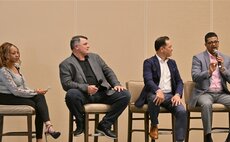
More than half of U.S. workers value remote work and flexibility over anything else as related to their careers, a new survey revealed.
The survey of more than 2,000 American adults, was conducted by global internet exchange operator, DE-CIX, giving insight into online workplace demands and other digital connectivity trends.
The youngest members of the workforce, ages 18-24, preferred remote work and flexibility than most, compared to over-55 workers (64 percent versus 31 percent).
Forty-four percent of Americans said they would consider relocating if given the option to work remotely. This was especially so among respondents in major tech and business hubs including New York City, San Francisco, and Los Angeles.
The continued move and desire for remote work presents two essential issues for IT leaders: One, determining which IT jobs can be performed remotely, and two, securing and proving scalable performance to remote workers and devices accessing the corporate network.
Due to cloud platforms and SaaS applications, more IT staff than ever are working remotely. According to one report, technology employees work an average of 2.28 days per week from home, the most of any job sector.
Those platforms also helped give rise to a growing overall remote workforce, a rise propelled by the pandemic. The same report predicts that by 2025 up to 36.2 million Americans will work remotely.
Of course, the growing remote workforce means a greater need for reliable internet access. DE-CIX's survey found that "reliable Internet access is prioritized over affordable childcare among U.S. parents of children under 18 (25 percent vs. 16 percent) when deciding where to live, highlighting the essential role of Internet connectivity in modern family dynamics."
On average, Americans report experiencing internet disruptions 53 times per year where they currently live, with 82 percent of acknowledging some level of Internet disruption, according to the survey results.
Moreover, respondents said which factors would improve their connectivity experience. These included "greater choice of Internet Service Providers (37 percent), more fiber/mobile rollout (3 percent), and increased state (22%) and federal investment (20 percent) in Internet infrastructure."
"These survey findings are a wake-up call for businesses and urban planners alike to invest in robust Internet infrastructure to retain and attract a vibrant, innovative workforce," Ivo Ivanov, CEO of DE-CIX, said in a news release. "Strengthening Internet Exchanges across America is no longer just about business continuity; it's about competitive advantage and community resilience."



















